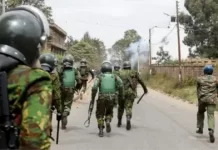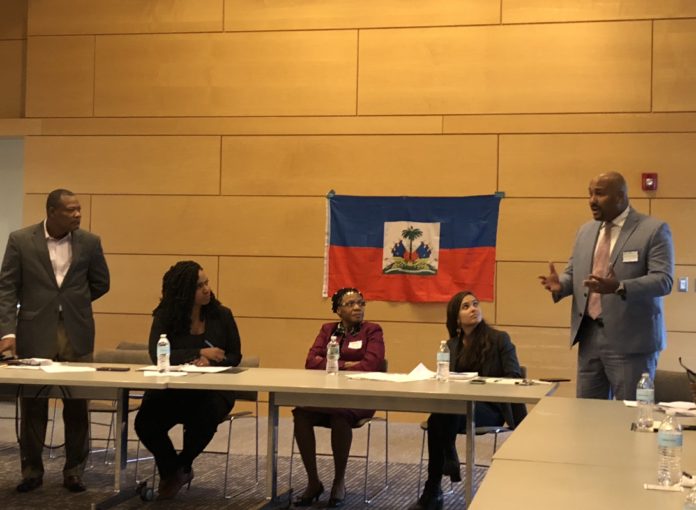
While most people are tuning into the impeachment inquiry or the 2020 election coverage, Haitians in Greater Boston are glued to news updates about the unrest back home.
The latest wave of protests has waged on for two months, calling for the resignation of President Jovenel Moïse over corruption allegations and soaring inflation. The conflict has shut down roads, schools and hospitals, bringing the country to the brink of collapse.
Haitian community leaders on Saturday relayed their fears and frustrations Saturday in a meeting with Congresswoman Ayanna Pressley at the Mattapan Branch of the Boston Public Library.
Some missed funerals because relatives told them it was too dangerous for them to return to the Caribbean nation. Others have children there who can no longer attend school. Many say they fear for their relatives and hurt to see their country in turmoil.
“I’m in pain … even in my bones,” Joujou Myrtil told Pressley, a Boston Democrat. “It hurts me because what’s happening in my country is so painful.”
Myrtil said she lost her cousin six months ago. As she went into labor, Myrtil’s cousin and aunt took a taxi to the hospital. They were confronted by armed men as they reached their destination, and the pregnant woman’s blood pressure shot up. She collapsed.
Myrtil didn’t get a chance to say goodbye to her cousin. She was told it wasn’t safe to return for the funeral.

At the center of the protests are allegations of corruption and misappropriation of funds under the Petrocaribe program, an oil distribution agreement between Haiti and Venezuela that started in 2008.
Under the program, Haiti had to pay only a portion of its oil bills in the short term and put the rest into a fund allocated for infrastructure improvements and social projects, Reuters reported. A Haitian Senate investigation released in late 2017 found that nearly $2 billion had been embezzled and stolen by Haitian leaders, primarily under President Michel Martelly’s tenure between 2011 and 2016.
Moïse, who was elected amid historically low voter turnout, was implicated in a January 2019 report by Haiti’s court of auditors. The report found that his company had been paid hundreds of thousands of dollars to reconstruct a road — and it never happened, according to the Miami Herald.
Protests broke out in July 2018 after Venezuela stopped sending oil and fuel prices soared. The demonstrations grew into a groundswell of opposition to Moïse, calling for his removal.
Sienna Merope-Synge, legal director at the Institute of Justice and Democracy for Haiti, noted that dozens have been killed in the protests or in gang violence, including at least one attack believed to have had state involvement.

While the unrest is unfolding more than 1,600 miles away, the conflict has Boston-area families stressed. Massachusetts is home to the third-largest Haitian diaspora in the U.S., behind Florida and Michigan.
Pressley said about 86,000 people of Haitian descent live in Massachusetts, citing census data. More than 25,000 of them live in the 7th District, which she represents. That includes most of Boston, Somerville, Randolph, Everett, Chelsea, Milton and part of Cambridge.
Haitian immigrants with Temporary Protected Status, which offers protections and work permits every two years to eligible foreigners fleeing natural disasters or political crises, fear being deported as the Trump administration pushes for an end to the protections.
Joelle Gamere, director of the Toussaint L’Ouverture Academy at Boston’s Mattahunt Early Elementary School, said some Haitian American students are stressed about the Haitian political crisis and fear that their parents with TPS or with no legal status may be deported.
Carline Desire, executive director of the Association for Haitian Women, said some Haitian mothers sent their young children back to Haiti to stay with relatives because the cost of living in Boston was too high. Now they fear their children are in danger.
“They don’t have the necessary means to provide proper housing and supervision because of the high cost of living in the Boston area, yet they are afraid that their children will not only be not going to school today, but they might get hurt,” Desire said.

A handful of business leaders, pastors and activists raised questions about the U.S. foreign policy stance toward Haiti.
The second oldest democracy in the Western Hemisphere, Haiti has faced periods of unrest for decades. The U.S. has often played a role in the nation’s politics, from its 1915 invasion of Haiti after the assassination of the country’s president, to the country’s backing of dictators François Duvalier and Jean-Claude Duvalier because of their anti-communist stances.
The U.S. maintains that Moïse was democratically elected president and that the government officials and the opposition need to sit down and open dialogue about resolving the political crisis, VOA Creole reported last month.
But Americans have come under scrutiny in the past year as former military officers have been accused of helping the embattled Haitian president. Two weeks ago, a former U.S. Marine who took a flight from Miami to Haiti was arrested after police said they found him carrying three cases of guns and ammunition, the Miami Herald reported.
Pressley said whatever the U.S. foreign policy stance on Haiti is, it wasn’t working for the Caribbean nation and loved ones in the United States.
In the meantime, she said, the American Dream and Promise Act that she co-sponsored could offer a path to legal status to various immigrants with temporary protections, including TPS holders. The bill passed the U.S. House but has yet to be taken up by the Senate. Pressley also co-sponsored the Global Fragility Act, which would create initiatives and funds to stabilize conflict-stricken areas with help from grassroots organizations.
Pressley said she did not have an immediate solution to propose. Instead, she said she would confer with colleagues who represent other Haitian American communities — namely Democrats Andy Levin of Michigan and Frederica Wilson of Florida — to figure out their next steps.
“I do not want to create false promises and expectations here because there’s too much hurt,” she said. “There are already broken hearts because of broken promises, because of systems that have already failed you and I do not want to be one more person on that list.”
“Now I can leave here with a charge, but I needed the education,” she added.
Desire said she was grateful for having Pressley meet with them, calling her leadership phenomenal, but she worried the political crisis in Haiti would end up drowned out by the political clashes in Washington, D.C.
She said, “My interpretation of what she understands is, ‘We have a lot of challenges. We hear you. We’ll bring it back, but there’s so much going on right now in D.C.'”





























![Phyllisia Ross – KONSA [Official Music Video]](https://haitiville.com/wp-content/uploads/2014/08/phyliisia.jpg)










